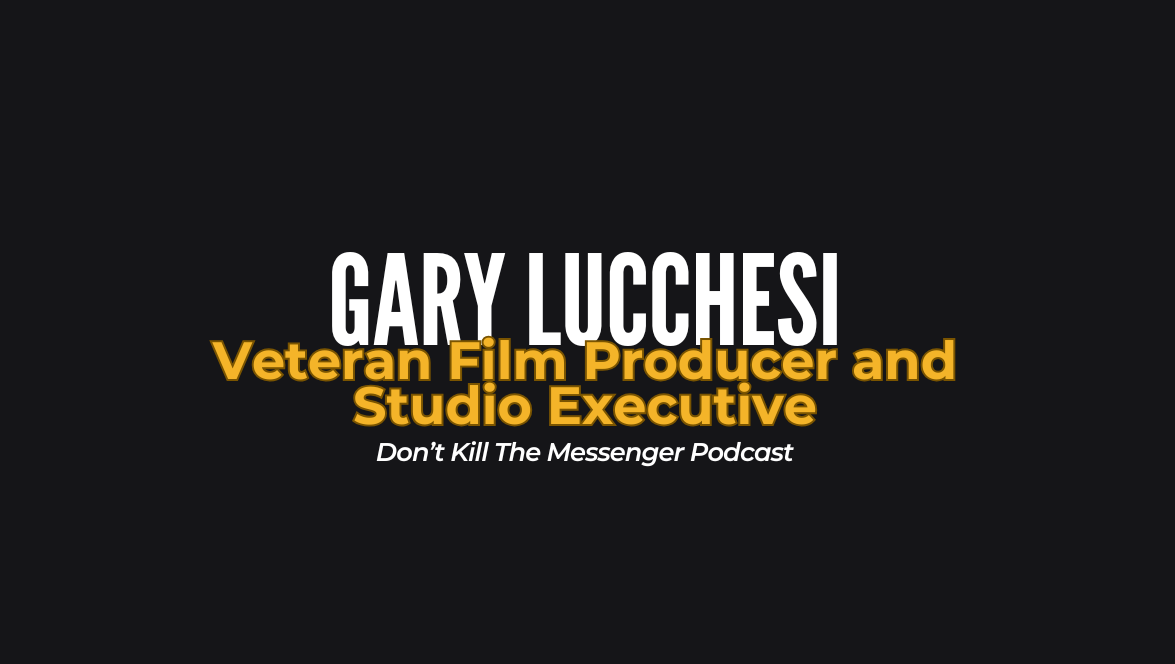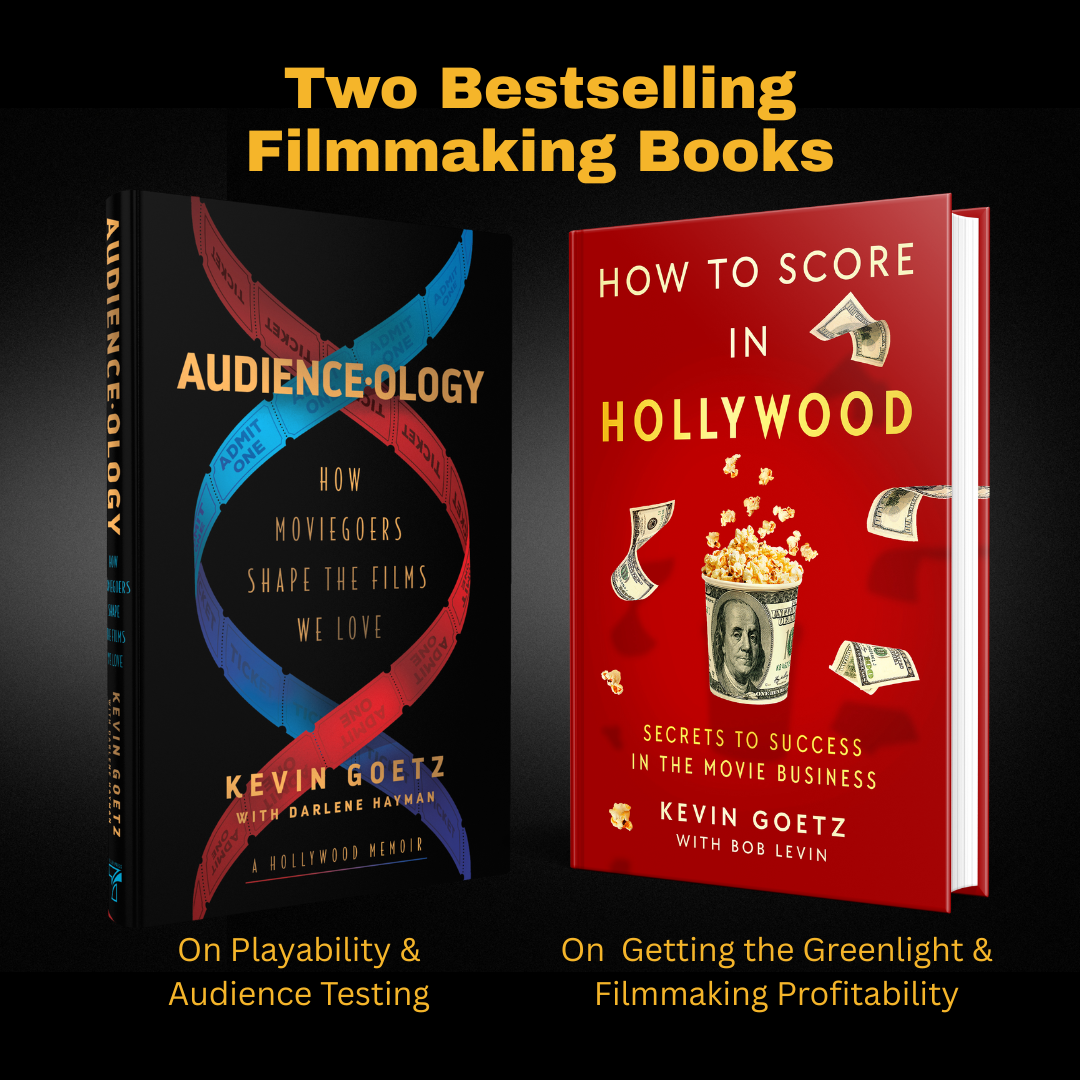
Don’t Kill the Messenger welcomes producer, studio executive and former President of the PGA, Gary Lucchesi
In this episode of “Don’t Kill the Messenger,” host Kevin Goetz sits down with Gary Lucchesi, the acclaimed producer and former President of the Producer’s Guild of America. From his early days as a talent agent at William Morris to his tenure as President of Production at Paramount Pictures, Gary has been a driving force behind numerous hit films. As a producer, his credits include Primal Fear, Million Dollar Baby, The Lincoln Lawyer, and Runaway Bride, among many others. In this insightful conversation, Gary shares stories from his career, discussing the art of assembling the right talent, the power of test screenings, and his thoughts on the future of the film industry.
Kevin on Gary Lucchesi:
We both love the business so much. Every time we sit down for a meal, first thing you say is, Kev, oh man, what’s going on with this business? And I laugh at it because I know where this lunch is going, but at the end of the lunch, we’re going to be rejuvenated. We’re going to be excited about the future. So, I thank you so much for your friendship, for your love, and you’re my man. You’re just one of my favorite people in the entire business.
From William Morris to Hollywood Heavyweight
Gary talks about his early days at the William Morris agency and the lessons he learned from mentors like Stan Kamen. He shares stories about signing talent like Michelle Pfeiffer and Kevin Costner:
So Wallis used to say to my wife, she said, bring in some people from the Academy Players Directory. So my wife goes through it, she sees this picture of Kevin Costner, she brings them in. So the next thing you know, Kevin and Wallis are chatting for like an hour, and he comes out and Wallis says he doesn’t have an agent. He’s represented by Wilhelmina, which was a modeling agency. He was working at Raleigh Studios in the grip department. And my wife called me up and she said, Wallis was just with this guy that she really liked. His name’s Kevin Costner. He’s looking for an agent. I said, send him over. So, Kevin comes over to William Morris. I’m a young agent. You weren’t supposed to sign unknowns at the time. But I liked him. And he was my age. He was my kind of guy. We were both working class kids, both ambitious. I felt, and I still feel that he had an affable movie star dynamic presence. It’s undefinable really, because it’s not necessarily related to beauty, it’s just related to confidence maybe. And charisma. Charisma, an it factor. So I signed him.
The Paramount Years and Saving Fatal Attraction
Gary’s career took him from talent agent to studio executive when he became President of Production at Paramount Pictures. During his tenure, he oversaw films like The Hunt for Red October and Fatal Attraction. He shares a fascinating story about how a focus group screening led to a major change in the ending of Fatal Attraction, turning it from a “bummer” into a box office hit:
We had this movie that was brilliant, but it ended in a tragic way. It ends with Glenn Close committing suicide to Madame Butterfly, and then Michael Douglas getting arrested. You’ve got a movie that the audience is riveted to, and then there’s a bummer ending. I was sitting next to Sherry Lansing and she grabs my arm. You could just see the audience deflate. Ned Tanen, who was running the studio, said, ‘We won’t release the movie unless you change the ending.’ So it was then a question of how are you going to change it? The focus group tells you what the problem is, but they don’t give you the solution.
Kevin adds:
The result of that was not just that you made a better movie, but there was millions and millions, tens of millions of dollars that were made because of that change.
Producing Primal Fear and Discovering Edward Norton
As a producer, one of Gary’s most notable films was Primal Fear, which launched the career of Edward Norton. Gary dives into the casting process and how Norton’s brilliant audition won him the role over other contenders like Leonardo DiCaprio:
We met like 2300 people. And no one could do that turn of going from the sort of southern person of Aaron to the rougher kid, Roy. And it was Edward who did it. But Edward created the stutter, which was not in the novel or in the screenplay. That was his demarcation. That was the tool that he used to show one character as opposed to the other. We tested him twice because there was a question of whether he could be menacing enough, but he was brilliant.
Million Dollar Baby and the Road to the Oscars
Another highlight of Gary’s producing career was Million Dollar Baby, which won four Academy Awards, including Best Picture. He shares the journey of making the film, from the script’s origins to Clint Eastwood’s involvement:
Million Dollar Baby was a script that Al Ruddy actually had developed. It came to us and we really liked it. It was initially sent to us to think about Robert Benton directing and Sandra Bullock starring. Sandy didn’t think Benton was the right director, so it didn’t end up happening. Then what happened was Clint Eastwood, Al gave it to Clint, and Clint said, ‘I’ll do it, but I’d have to direct it.’ I remember going to see Paul Haggis, and he was on the set of Crash. I said, ‘I really wouldn’t be having this conversation if it was any other directors besides Clint Eastwood. If it was Steven Spielberg or Martin Scorsese, I wouldn’t be having this conversation. But Clint will star in the movie.’ At the end of the day, Paul said, ‘I agree, you’re right.’
The Shifting Landscape of the Film Industry
In the latter part of the conversation, Kevin and Gary discuss the seismic changes in the film business, from the rise of streaming to the impact of the pandemic and strikes. Despite the challenges, Gary shares his optimism about the next generation reinventing the industry:
It’s amazing that in Old Hollywood, they did all these movies about making movies, Singing in the Rain. And then the last one was probably La La Land that was about making movies. Babylon, and about the joy that people have in making movies. And I said, that’s a problem with Hollywood is that nobody’s making movies about the joy of making movies. And then I was thinking about it and I said, Jesus, I said, maybe I’m a thousand percent wrong. I think I’m a thousand percent wrong. And she kind of looks at me and I said, what are the young people doing today? TikTok. They’re making little movies. You’ve got all these kids that are taking their cell phones and they’re being creative and they’re making money. I said, they’re like the pioneers of Hollywood. They’re the same people as Busby Berkeley doing a little comedy sketch or Charlie Chaplin doing something. They’re doing their own version of art.
Gary Lucchesi brings his passion for producing, his keen eye for talent, and his deep understanding of the filmmaking process to this conversation with his friend, and host, Kevin Goetz. For anyone interested in the art and business of filmmaking, this episode offers a front-row seat to one of the industry’s most accomplished and respected producers.
For the full conversation, check out the podcast episode here. And let us know your thoughts on the episode in the comments!
Don’t Kill the Messenger, hosted by movie and entertainment research expert Kevin Goetz, brings his book Audienceology to life. This bi-monthly podcast takes a peek behind the filmmaking curtain as Kevin talks with famous filmmakers, studio executives, stars, and other creatives about movies, filmmaking, audience test screenings, and much more.
For more information about Gary Lucchesi:
Wikipedia: https://en.wikipedia.org/wiki/Gary_Lucchesi
IMDB: https://www.imdb.com/name/nm0524342/
LinkedIn: https://www.linkedin.com/in/gary-lucchesi-26204127a
For more information about Kevin Goetz:
Website: www.KevinGoetz360.com
Audienceology Book: https://www.simonandschuster.com/books/Audience-ology/Kevin-Goetz/9781982186678
Facebook, Twitter, Instagram: @KevinGoetz360
Linked In @Kevin Goetz
Screen Engine/ASI Website: www.ScreenEngineASI.com






